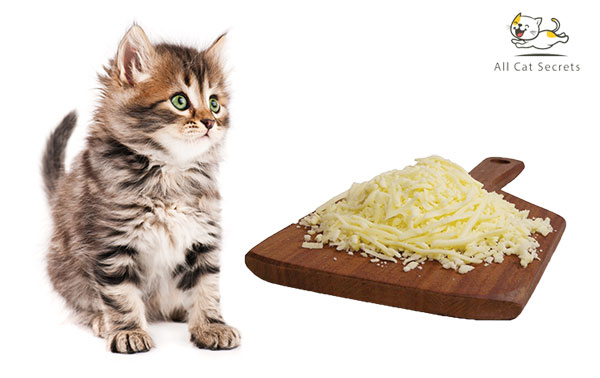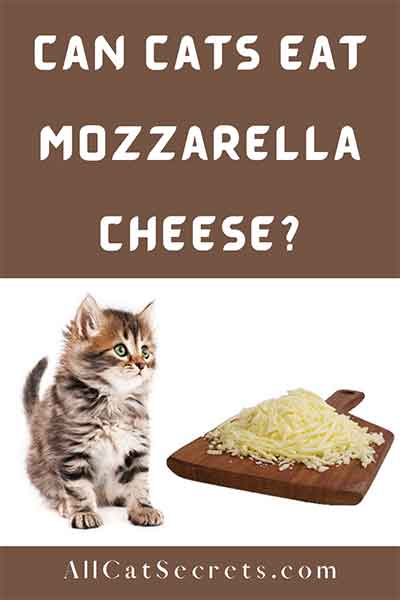Cheese is a famous ingredient in numerous cuisines around the world, due to its finger-licking taste and an incredible amount of nutrients. However, that’s as far as humans are concerned. When it comes to people foods for pets, the rules of taste and nutrition don’t always apply. Indeed, many foods deemed safe and nutritionally beneficial for humans might prove highly toxic to our furry friends.
So, if mozzarella cheese is a common ingredient in your kitchen shelf and you also happen to own a cat, it’s important to store the food properly to minimize your cat’s interaction with it. The best way to go about that is to start by understanding whether you can share mozzarella cheese with your feline friend in the first place.
And that brings us back to the question, can cats eat mozzarella cheese?
The simple answer is yes. Like most types of cheese, mozzarella cheese isn’t known to contain toxins that could induce medical emergencies in cats. The cheese might even contain some potentially beneficial nutrients. However, note that the keyword here is moderation.
Also, there are always things to be wary about when it comes to cats and cheese. Read on for a compressive guide into the safety and possible dangers of mozzarella cheese for cats.
Table of Contents
Can Cats Have Mozzarella Cheese?
Cats can have mozzarella cheese.
Mozzarella isn’t inherently harmful to our feline friends. That’s because the food lacks the compounds known to cause toxicity in cats. But as we’ve just mentioned, the matter of cats and cheese is a rather complicated one.
Like most cheese types, mozzarella may contain ingredients that could hurt your cat. Examples include salt, fats, and even spices. There’s also the question of dairy intolerance to worry about.
So, while you can freely share mozzarella with your kitto, it’s generally advisable to consider safer cheese alternatives. That’s especially if dealing with a kitten, sick cat, or a cat that’s never been introduced to cheese before.
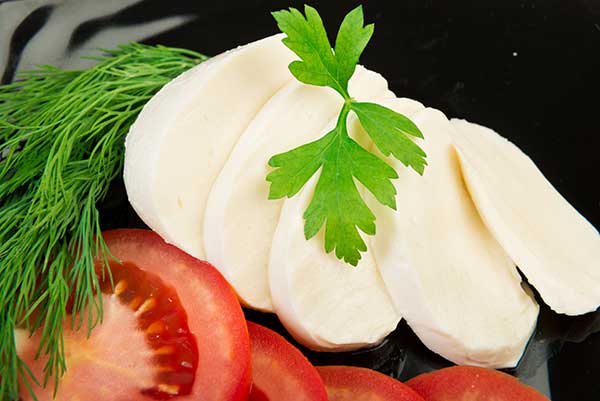
More About Mozzarella
As a cheese lover who also happens to be a proud cat owner, you’ll occasionally find yourself wondering, ‘can I feed my cat mozzarella cheese?’
Mozzarella may not be injurious to your cat in small amounts. But too much of the cheese could induce worrying side effects. It’s worse if the food contains other compounds known to be inherently harmful to cats.
One way to predict the effects of mozzarella on cats is to understand what this cheese is made of.
Mozzarella cheese is a traditionally southern Italian cheese derived from the milk of Italian buffalo and made using the pasta filata method. In some countries, the cheese can also come from sheep or goats.
Mozzarella cheese generally appears white when fresh. Fresh mozzarella may also be slightly yellow, depending on the animal’s diet and the preparation method.
Mozzarella cheese can be consumed as a standalone snack or used in various recipes. Common foods containing mozzarella cheese include some types of pizza, various pasta dishes, and salads.
Another thing worth noting about Mozzarella cheese is its relatively short shelf life due to its high moisture content. That explains why the cheese is traditionally served only a day after it’s prepared. However, commercially-produced mozzarella may last for several weeks if kept in brine, sold in vacuum-sealed packages, or preserved in the refrigerator.
- This pack of Delectables Stew contains twelve (12) 1.4-ounce lickable cat treats.
- CATS LICKS THE BOWL CLEAN: These stew cat treats combine tender chicken or succulent fish with a hearty and rich sauce for a cat...
- TASTY TEXTURE FOR CAT TREATS: The meat and sauce are entangled in this tasty wet texture, ensuring your kitty eats the whole cat...
Last update on 2024-07-20 / Affiliate links / Images from Amazon Product Advertising API
Does Mozzarella Have Any Health Benefits For Cats?
A one-ounce serving (about 28 grams) of mozzarella contains the following nutritional profile;
- 85 calories
- 6 grams of protein
- 6 grams of fat
- 1 gram of carbohydrate
- 143 milligrams of calcium
- 138 milligrams of sodium
In addition to the above nutritional elements, mozzarella cheese also contains significant amounts of vitamins A, B12, and K-2, as well as riboflavin, zinc, phosphorus, and omega-3 fatty acids.
The following are the specific ways your cat may benefit from mozzarella cheese;
1. Promoting Strong Bones and Teeth
Mozzarella cheese is loaded with calcium. Calcium supports the healthy development of bones and teeth.
Serving mozzarella cheese to your cat as an occasional treat is a perfect way to prevent teeth cavities while also minimizing the risks of bone fractures.
2. Protection from Disease
Mozzarella is rich in conjugated linoleic acid (CLA). CLA has been widely researched for its antioxidant properties. Studies have shown that the compound may help to prevent the risks of heart disease and obesity.
Conjugated linoleic acid also boasts powerful anti-inflammatory properties. Therefore, foods rich in the compound might help to minimize the risks of inflammatory conditions like arthritis, inflammatory bowel disease (IBD), and some cancers.
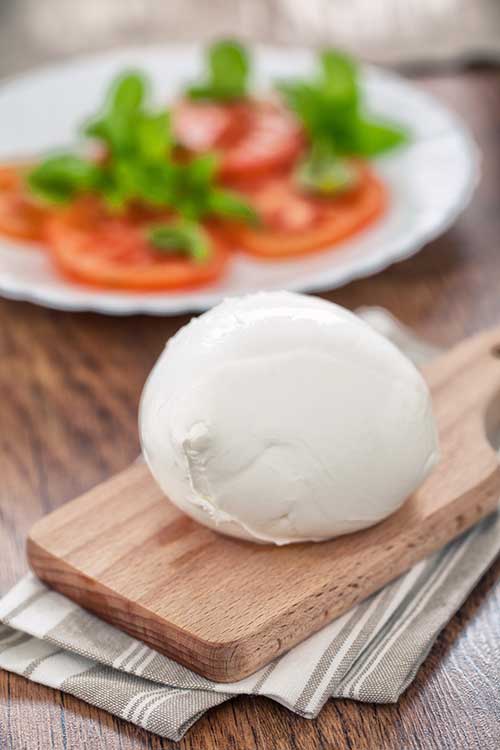
Is Mozzarella Cheese Okay For Cats?
We’ve just pointed out that mozzarella cheese is rich in calcium that can support your cat’s teeth and bones. Mozzarella is also loaded with conjugated linoleic acid, which is noted for its antioxidant properties. Plus, the cheese contains numerous other essential vitamins and minerals.
To that extent, it’s logical to conclude that mozzarella cheese is okay for cats.
However, many human foods aren’t as safe for our feline friends as they are for us. And when it comes to mozzarella or cheese in general, you want to exercise even greater caution before sharing these foods with your kitto.
Maybe you’re always wondering to yourself, ‘is mozzarella cheese good for cats?’
Again, mozzarella is only safe and beneficial to cats if served in moderation. Feeding your cat mozzarella too often or too much could result in a series of negative effects. The following section expounds further on that.
Possible Issues With Mozzarella for Cats
Mozzarella is worryingly high in fat and calories. A 1-ounce serving of raw mozzarella cheese boasts as much as 6 grams of fat and 85 calories. The adverse effects of high-fat diets are widely documented.
For starters, fat is infamous for its laxative effects. Consuming fat-rich mozzarella can induce unintentional diarrhea and dehydration in cats.
Fatty foods are also notorious for triggering obesity and overweight. That’s particularly a major concern for cats considering that these animals spend up to two-thirds of their time sleeping, with a huge chunk of their waking hours dedicated to grooming. So, it’s far easier for cats to gain weight than lose it.
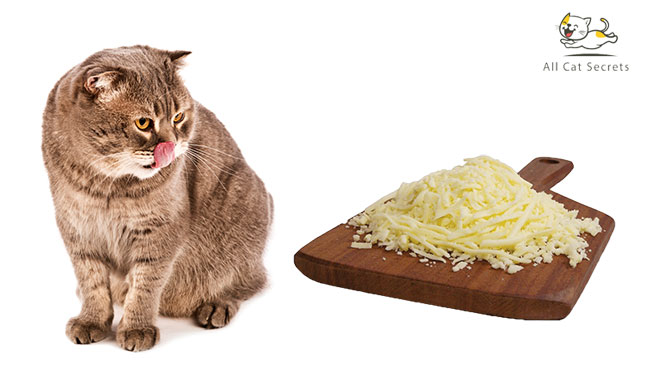
That begs the question, can overweight cats eat mozzarella cheese?
Absolutely not. Mozzarella is a high-fat food that can induce weight gain. That only worsens the situation for cats that are already overweight.
Besides causing diarrhea and weight gain, high-fat foods like mozzarella cheese may also trigger or exacerbate pancreatitis.
Pancreatitis is an inflammation of the pancreas. Common symptoms include;
- Pain in the upper abdomen, which may also radiate to the backNausea and vomiting
- Appetite loss
- Diarrhea
- Dehydration, resulting from diarrhea
- Fever
- Rapid pulse rate
Last but not least, the high fat content in mozzarella may increase your cat’s risks of other chronic illnesses, such as heart disease.
- CONTAINS: This pack of Delectables Squeeze Ups contains 32 (0.5 ounce eaches) squeezable cat treat tubes.
- INTERACTIVE TREATING: Squeeze Ups provide the purrfect bonding experience between you and your cat – this playful & interactive...
- PUREE TREATS: Each lickable treat tube is stuffed with a thick and creamy puree treat that is made from real poultry and fish.
Last update on 2024-07-20 / Affiliate links / Images from Amazon Product Advertising API
The following are other potential issues with mozzarella cheese for cats;
1. Lactose Intolerance
Lactose intolerance is caused by the absence or depressed functions of the enzyme lactase, which digests lactose. Lactose is a compound in all unprocessed dairy products.
So, your cat can develop severe sensitivity to mozzarella if it happens that the animal is lactose intolerant.
Lactose intolerance generally manifests in gastrointestinal symptoms, such as nausea, vomiting, diarrhea, and abdominal pain.
2. Allergic Reactions
While some cats might develop mozzarella intolerance due to the lactose content in this cheese, others may suffer other forms of allergy.
Allergic reactions to mozzarella result from the fact that cats are not inherently cheese eaters. Therefore, even a teeny-tiny amount of cheese might trigger adverse reactions in cats. Plus, mozzarella contains casein, a protein known to trigger allergy.
Mozzarella allergy in cats generally presents as an upset stomach.
Are cats allergic to mozzarella cheese then?
Cats can develop mozzarella allergies. Allergic reactions are usually more intense for cats getting introduced to mozzarella for the first time.
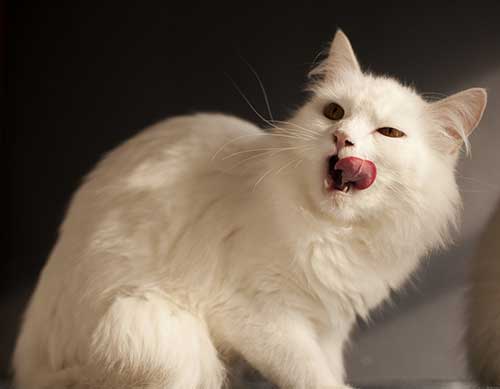
3. Blood Sugar and Cholesterol Issues
There’s one gram of carbohydrate in 28 grams of raw mozzarella cheese.
That may not sound like much. But if you consider that the cheese is also high in fats, it’s clear to see why a consistent diet of mozzarella cheese can throw your kitto’s blood sugar and cholesterol levels off balance.
If unchecked, mozzarella can trigger or worsen diabetes.
So, can diabetic cats eat mozzarella cheese?
Diabetic cats shouldn’t consume mozzarella cheese. That’s because mozzarella is relatively high in sugars and fats, two compounds known to aggravate diabetes.
4. Kidney Problems
Fresh mozzarella may not pose any serious threat to your cat’s kidney. But the equation changes drastically once the cheese undergoes extensive processing.
Commercially-produced mozzarella cheese usually contains brine (concentrated salt solution), which is commonly added to prolong the product’s shelf life.
Brine-preserved foods are potentially toxic to cats. That’s due to their ability to trigger sodium ion poisoning, a condition known for its kidney-damaging effects. Symptoms of sodium ion poisoning include excessive urination (followed by excessive thirst sensation), fever, tremors, seizures, and coma. The condition is fatal if it lasts long enough without treatment.
Therefore, cats with kidney disease should generally avoid store-bought mozzarella cheese.
Other common ingredients in processed mozzarella cheese that could be harmful to cats include spices like garlic and onions, whey, and citric acid.
- High protein formula with real salmon as the first ingredient
- Natural prebiotic fiber nourishes specific intestinal bacteria for digestive health
- Fortified with guaranteed live probiotics for digestive and immune health
Last update on 2024-07-20 / Affiliate links / Images from Amazon Product Advertising API
Is Mozzarella Cheese Bad for Cats?
The answer to this question depends on how the potential benefits of mozzarella cheese for cats stack up against its side effects.
Although mozzarella contains several vitamins and minerals, the cheese is also laden with numerous substances considered toxic to cats.
After considering all factors across both sides of the spectrum, it appears that mozzarella isn’t the type of food you’d want to share with your kitto.
Can Mozzarella Cheese Kill a cat?
Feline deaths resulting directly from eating mozzarella are almost unheard of. As we’ve reiterated throughout the post, fresh mozzarella doesn’t contain any substances known to be toxic to cats.
However, mozzarella is still dangerously high in fats and sodium. Fat is infamously associated with weight gain, gastric irritation, and increased risks of pancreatitis, whereas sodium may harm your cat’s kidney.
What makes mozzarella cheese even more potentially harmful is that the cheese usually contains spices like garlic and onions, all of which could be dangerous for cats.
So, can a cat die from eating mozzarella cheese?
Your cat may not drop dead from eating mozzarella cheese. However, the side effects caused could be fatal in the long run.
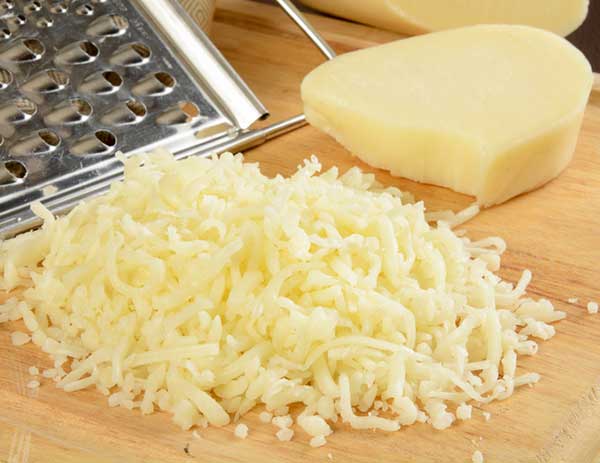
Can Cats Eat Mozzarella Cheese Every Day?
Cats shouldn’t eat mozzarella cheese every day but rather as an occasional treat.
It’s also advisable to talk to your veterinarian before sharing mozzarella or any other cheese with your kitto. And if the vet approves of it, don’t stop there. Ask them to help you calculate the right amount of mozzarella to feed your cat. That quantity will depend on numerous factors, such as your cat’s age and body weight.
Another best practice when feeding mozzarella cheese to cats is to shred large cheese blocks into manageable portions. That helps to minimize choking risks.
Maybe you’ve always wondered, can cats eat shredded mozzarella cheese? And what of mozzarella sticks, can cats eat mozzarella sticks?
The answer is yes to both questions. Just ensure you give your cat bite-sized chunks of mozzarella sticks or shreds.
Most importantly, serve the cheese to your kitto in small amounts, monitoring the animal closely for any adverse effects.
What to Do If Your Cat Ate Mozzarella
One of the frequently asked questions by cat owners is, ‘my cat ate mozzarella cheese, should I be worried?’
The first course of action if you suspect that your cat has eaten mozzarella behind your back is to establish the quantity consumed.
As previously mentioned, there shouldn’t be any cause for alarm if your cat has only helped himself to a few bites of mozzarella cheese. The problem comes in if the animal has consumed more mozzarella than is his fair share. In this case, your best bet would be to take him to the vet immediately.
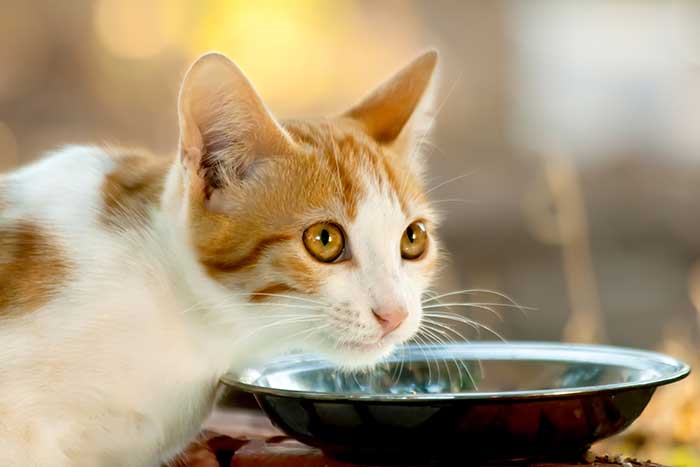
Other FAQs on Cats and Mozzarella
Can Cats Eat Fresh Mozzarella Cheese?
Cats can eat fresh mozzarella in small amounts.
Can Kittens Eat Mozzarella Cheese?
Kittens can eat mozzarella cheese. However, it’s probably safer to avoid giving your kittens mozzarella at all costs. That’s due to their highly sensitive digestive tract, which can easily get irritated by the high fat content in mozzarellas.
Can Elderly Cats Eat Mozzarella Cheese?
Just like kittens, elderly cats may develop severe intolerance to mozzarella.
Can Cats Eat Mozzarella Cheese Pizza?
Cats can eat mozzarella cheese pizza provided that the pizza is formulated with pet-safe ingredients.
Can Pregnant cats Eat Mozzarella Cheese?
Pregnant cats shouldn’t consume mozzarella due to their compromised immune system.
Can Nursing cats Eat Mozzarella Cheese?
The rules of mozzarella for pregnant cats also apply to nursing cats. Therefore, it goes that nursing cats shouldn’t eat mozzarella either.
- Real turkey is the number 1 ingredient in this Purina indoor cat food to help provide the protein she needs for strong muscles,...
- High protein cat food kibble with 10 percent less fat than Purina ONE Tender Selects Blend With Real Chicken helps her maintain a...
- A SmartBlend of fiber-rich nutrition in weight control dry cat food helps minimize hairballs, and four antioxidant sources support...
Last update on 2024-07-20 / Affiliate links / Images from Amazon Product Advertising API
Conclusion
Fresh mozzarella cheese contains no compounds known to be immediately toxic to cats. However, the potential drawbacks of mozzarella far outweigh the benefits.
Therefore, you’d do well to consider safer mozzarella alternatives. Better yet, stick to your regular pet-approved cat food.
Checkout Our Favorite Cat Products
1. Best Online Course For Cat Parents
Our favorite: The Cat Language Bible (How to Finally Understand And Speak to Your Cat) – A new form of cat to human communication that many cat owners have dreamed about… but few have actually thought possible.
2. Best Immune Support For Cats
Our favorite: Tomlyn Immune Support – Best Supplement for Cats and Kittens.
3. Best Cat Treats
Our favorites: LIFE ESSENTIALS All Natural Freeze Dried Chicken And Sheba Meaty Tender Sticks – Both are Great.

